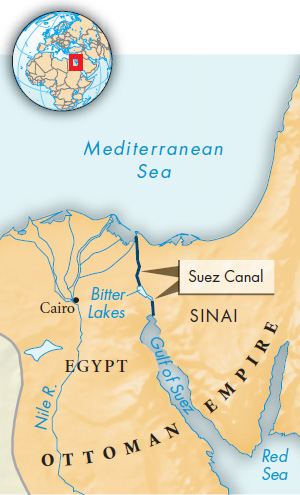A History of Western Society: Printed Page 796
A History of Western Society, Value Edition: Printed Page 802
Western Penetration of Egypt
Egypt’s experience illustrates not only the explosive power of the expanding European economy and society but also their seductive appeal. European involvement in Egypt also led to a new model of formal political control, which European powers applied widely in Africa and Asia after 1882.
Of great importance in African and Middle Eastern history, the ancient land of the pharaohs had since 525 B.C.E. been ruled by a succession of foreigners, most recently by the Ottoman sultans. In 1798 French armies under young General Napoleon Bonaparte invaded the Egyptian part of the Ottoman Empire and occupied the territory for three years. Into the power vacuum left by the French withdrawal stepped an extraordinary Albanian-born, Turkish-speaking general, Muhammad Ali (1769–1849).
First appointed governor of Egypt in 1805 by the Ottoman sultan, Muhammad Ali set out to build his own state on the strength of a large, powerful army organized along European lines. He drafted for the first time the illiterate peasant masses of Egypt, and he hired French and Italian army officers to train both these raw recruits and their Turkish officers in modern military methods. He also reformed the government, cultivated new lands, and improved communication networks. By the end of his reign in 1848, Muhammad Ali had established a strong and virtually independent Egyptian state, to be ruled by his family on a hereditary basis within the Ottoman Empire (see “Reform and Readjustment in the Ottoman Empire” in Chapter 23).

Muhammad Ali’s modernization program attracted large numbers of Europeans to the banks of the Nile. The port city of Alexandria had more than fifty thousand Europeans by 1864. Europeans served not only as army officers but also as engineers, doctors, government officials, and police officers. Others turned to trade, finance, and shipping.
To pay for his ambitious plans, Muhammad Ali encouraged the development of commercial agriculture. This development had profound implications. Egyptian peasants were poor but largely self-sufficient, growing food for their own consumption on state-owned lands allotted to them by tradition. Faced with the possibility of export agriculture, high-ranking officials and members of Muhammad Ali’s family began carving large private landholdings out of the state domain. These new landlords made the peasants their tenants and forced them to grow cash crops such as cotton and rice geared to European markets. Egyptian landowners “modernized” agriculture, but to the detriment of peasant living standards.
These trends continued under Muhammad Ali’s grandson Ismail (ihs-MAH-eel), who in 1863 began his sixteen-year rule as Egypt’s khedive (kuh-DEEV), or prince. Educated at France’s leading military academy, Ismail was a westernizing autocrat. The large irrigation networks he promoted boosted cotton production and exports to Europe, and with his support a French company completed the Suez Canal in 1869. The Arabic of the Egyptian masses replaced the Turkish spoken by Ottoman rulers as the official language; young Egyptians educated in Europe spread new skills; and Cairo acquired modern boulevards and Western hotels. As Ismail proudly declared, “My country is no longer in Africa, we now form part of Europe.”2
Yet Ismail was too impatient and reckless. His projects were enormously expensive, and by 1876 Egypt owed foreign bondholders a colossal debt that it could not pay. France and Great Britain intervened and forced Ismail to appoint French and British commissioners to oversee Egyptian finances to ensure payment of the Egyptian debt in full. This momentous decision marked a sharp break with the past. Throughout most of the nineteenth century, Europeans had used military might and political force primarily to make sure that non-Western lands would accept European trade and investment. Now Europeans were going to effectively rule Egypt.
Foreign financial control evoked a violent nationalistic reaction among Egyptian religious leaders, young intellectuals, and army officers. In 1879, under the leadership of Colonel Ahmed Arabi, they formed the Egyptian Nationalist Party. Continuing diplomatic pressure on the government, which forced Ismail to abdicate in favor of his weak son, Tewfiq (r. 1879–1892), resulted in bloody anti-European riots in Alexandria in 1882. A number of Europeans were killed, and Tewfiq and his court had to flee to British ships for safety. When the British fleet bombarded Alexandria, more riots swept the country, and Colonel Arabi led a revolt. But a British expeditionary force put down the rebellion and occupied all of Egypt that year.
The British said their occupation was temporary, but British armies remained in Egypt until 1956. They maintained the façade of Egypt as an autonomous province of the Ottoman Empire, but the khedive was a mere puppet. British rule did result in tax reforms and somewhat better conditions for peasants, while foreign bondholders received their interest and Egyptian nationalists nursed their injured pride.
British rule in Egypt provided a new model for European expansion in densely populated lands. Such expansion was based on military force, political domination, and a self-justifying ideology of beneficial reform. This model predominated until 1914. Thus did Europe’s Industrial Revolution lead to tremendous political as well as economic expansion throughout the world after 1880.